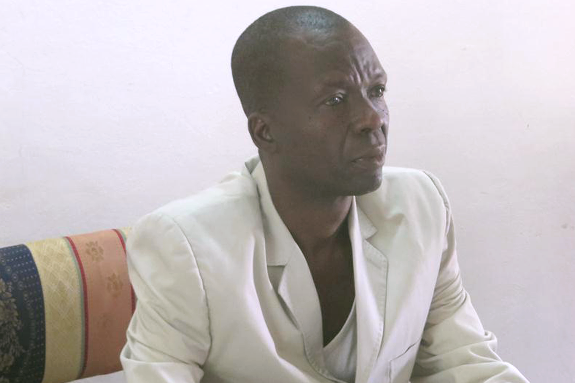
18 May Three Questions with Dr. Christophe Ndoua: Finding collaborative solutions to malaria control in Central African Republic
Dr. Christophe Ndoua is the coordinating director for the National Malaria Control Program (NMCP) in the Central African Republic. HRH2030’s Capacity Building for Malaria activity supports countries such as the Central African Republic to achieve their malaria control and elimination goals.
Question 1: Tell us about the malaria situation in the Central African Republic and the work that your program has been doing.
In the Central African Republic (CAR), malaria is among the top causes of morbidity and mortality, and according to data from the National Health Information System, we have concluded that the situation is worsening. In 2017, malaria represented 63% of consultations – rising from 40% in 2001 – of which over half are children under 5 years (52%). To respond to this difficult situation, we receive funding from The Global Fund to Fight AIDS, Tuberculosis and Malaria to advance malaria case management and prevention. We have partnered with humanitarian NGOs such as Medicins Sans Frontieres (MSF) and MENTOR, and have most recently, with support from the HRH2030-CBM Long Term Technical Advisor, extended the 2018-2022 National Strategic Plan to 2023 with plans to scale-up integrated community case management (iCCM) with Community Health Workers.
Question 2: What do you think are the country’s biggest challenges in the fight against malaria?
Challenge number one is security, which makes it difficult implement malaria control measures at the national level, including the mass distribution of mosquito nets for universal coverage. Since armed groups control certain regions, particularly those in the north, it is sometimes impossible to deploy personnel in these regions to carry out activities. For example, we have not led the mass campaign nationwide in certain regions since 2015, due to security issues.
Outside of security risks, the CAR NMCP is faced with a number of challenges. First, our main partner is the Global Fund, making it imperative for us to expand into more partnerships that could help fill execution gaps in our strategic plan. Global Fund funding alone is not enough to, for example, finance the necessary resources for advanced responses to insecticide resistance within malaria vectors. In addition to lacking funding and partners, the NMCP is faced with insufficient human resources and low capacity to respond to these challenges. We need an M&E officer, a supply chain specialist, a finance specialist, a public health doctor for prevention, public health doctors for case management and prevention and entomological research. More partnerships and high-capacity staff could allow us to better plan and implement a national work plan that integrates all partner activities, monitor and manage of operational-level malaria control activity data, and mobilize resources effectively enough to attract new partners. The partnership with HRH2030’s Capacity Building for Malaria activity is a first step towards addressing all of these challenges – it diversifies the NMCP’s partnership network, provides integral strategic support to areas where there may be staffing gaps, and supports training current staff, plus technical support in drafting the Global Fund NFM3 Grant Request could bring in the additional funding necessary to hire more high-quality staff, improve processes, and attract new partners.
Question 3: Through our Capacity Building for Malaria (CBM) activity, HRH2030 has been working with the NMCP in close coordination with the U.S. President’s Malaria Initiative to build country capacity and improve the effectiveness and efficiency of Global Fund grant implementation, contributing to the overarching shared goal of reducing malaria deaths. How is this activity supporting you and your team as you move toward malaria control?
Thanks to the additional financial, technical, and logistical support from our partnership with HRH2030, we were able to successfully draft our Global Fund 2021-2023 New Funding Model 3 Grant Request. The HRH2030-CBM Technical Advisor, who works with the NMCP and in close collaboration with the President’s Malaria Initiative (PMI), supported the NMCP in preparing the terms of reference and agenda of our two Grant Request Drafting Workshops, briefed members of the Global Fund Grant Request editorial board on the Global Fund’s guidelines, educated the workshop participants on common and avoidable mistakes when drafting Global Fund Grant Requests, and facilitated and conducted quality review of group work. We are excited for the technical expertise and support the HRH2030-CBM program has and will provide in facing our current challenges and look forward to working together in the fight against malaria in the Central African Republic.
Photo: Dr. Christophe Ndoua. As the coordinating director for the Central African Republic’s National Malaria Control Program, he is in charge of the implementation of the national strategic plan to reduce malaria.





